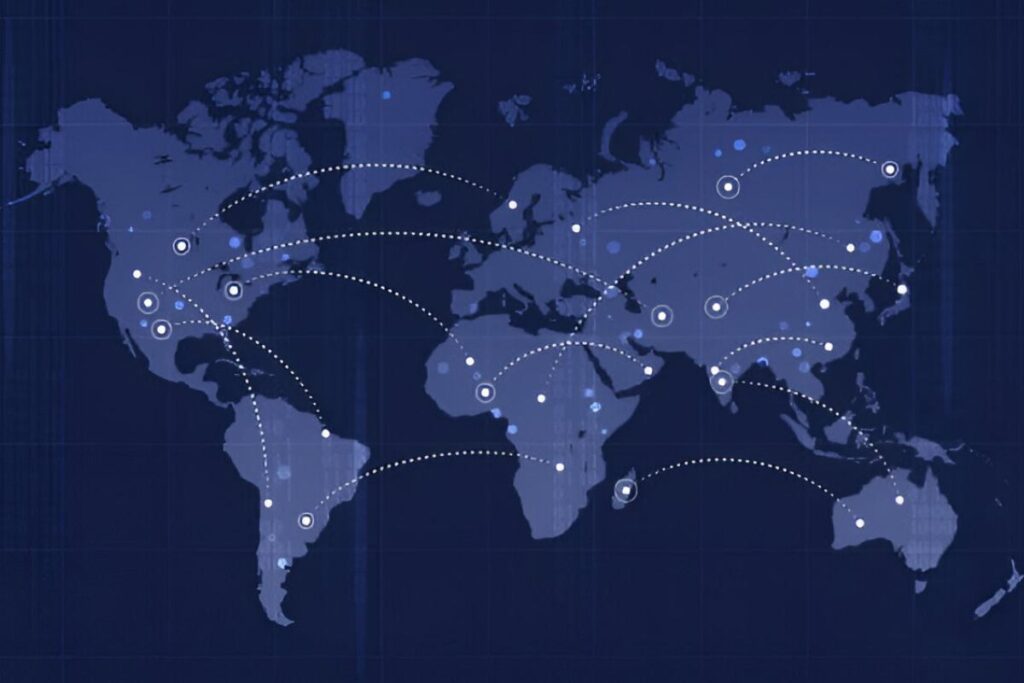However, it’s undeniable that maintaining a strong network of professional contacts can profoundly impact career success. If managed well, networking opens new opportunities faster and provides a competitive advantage at every stage of one’s career.
Speaking of competitive advantage, one of the professional areas where the power of networking can be discounted is in the technology industry, particularly software development.
The continued shortage of qualified professionals in this sector means organisations actively seek skilled professionals to fill positions, while software engineer/developer positions are already overcrowded.
What does this mean for you as a hiring manager or a prospective software developer?
In this article, we’ll analyse the importance of networking as a practical way to access other specialised software engineering positions. We’ll also briefly review the cost-saving benefits it entails.
What is networking?

Networking involves exchanging material and ideas between people with common interests or professions. Networking often occurs in an informal social setting and is especially important for both recruiters and job seekers.
Networking is essential for professionals, as it allows them to expand their contacts and circle of connections, hoping to discover new job opportunities in their field. On the other hand. Recruiters can expand their candidate pool and find developers they might hire in the future.
Since technology takes time to improve and new trends emerge quickly, the recruiting landscape seems to be constantly changing. As do general employment practices.
However, one key aspect of recruiting that has always been and will continue to be constant is the focus on people. It’s no wonder that up to 80% of available vacancies are never advertised and are always filled by someone in someone’s network.
Therefore, whether in person, in person, or online, networking is the tool for recruiters when looking to fill a specific position. It also offers job seekers, both active and passive, the opportunity to quickly find work and earn better salaries for software engineers.
There are four main types of professional networks:
- Operational Networks: This network involves people working together to accomplish a specific job.
- Personal Networks: This network includes alums, social, and professional groups and allows you to interact with a varied group of like-minded individuals and professionals. They are essential for career transitions, connecting you with new people and opportunities.
- Strategic Networks involve networking with colleagues and people with experience in your field. Strategic networks are essential because they open your mind to more aspects of your career, inform you about best practices, and teach you new strategies.
- Nodal Networks: Also known as “smart networks,” nodal networks help you create and maintain connections with people who can help you in a specific career scenario.
Are there specific benefits of social media in software development? Below, we list five positive effects of recruiting within your network.
5 Positive Effects of Networking in the Software Development Recruiting Community
As mentioned above, recruiting is often about people. And whether you’re looking for a junior or senior software developer for a position, having a network of potential candidates (or the lack thereof) can be decisive in your search.
Here are the benefits of leveraging your existing network when recruiting:
Reduce Recruiting Costs
One of the most important benefits of outsourcing your system is the savings it brings. Recruiting is costly, and any savings can be wasted on improving your bottom line.
Think about it:
You don’t have to pay people in your network to advertise your openings. When they share these opportunities, they often offer free promotions, allowing you to reduce the expense you would otherwise spend on posting traditional job ads.
You can also save on external recruiting costs, as people in your network better understand your company’s values and culture, making you a better salesperson.
Reduce Hiring Turnaround Time
Let’s face it: time in the business world is valuable. While you may allocate sufficient funds to complete the recruiting process, it’s easy to underestimate the time it takes to hire someone.
Your hiring managers must spend significant time outside their regular work writing, creating, posting, and promoting job postings on various platforms.
Furthermore, job openings imply limited productivity in the position you’re seeking to fill, and a longer-than-usual hiring process can extend the loss of productivity to your company’s overall performance.
Seeking qualified candidates within your network eliminates advertising costs and simplifies the hiring process at the interview stage.
Reduce the Cost of a Bad Hire
A new hire who isn’t simply fired can be disastrous for your business. This could be an unqualified person who feels the position isn’t working and voluntarily leaves the company, or someone you ask to resign from their new position.
This situation means restarting the recruitment process and may put current projects on hold.
However, spending time with people in your network gives you a first impression of their capabilities. This, in turn, makes it easier to assign tasks based on their skills.
You can also recognize their strengths and weaknesses and plan how to help them develop.
Increases Employee Retention
Rendering to a 2016 report by JobInvite.com, the best talent emerges from social recruiting based on referrals from close networks. The same report indicates that employees hired through network referrals tend to stay with a company longer than those hired through other channels.
This is good news and helps reduce employee turnover, which can subject you to an endless recruiting cycle.
Boost Your Brand Profile
In the software development industry, people prefer to work with or accept jobs from software engineers at prominent development companies. By frequently attending social events, potential candidates will begin to recognise and engage more with your brand.
This benefits you build your reputation as a reliable, knowledgeable, and supportive employee and makes it easier to fill an open position within your network.
Disadvantages of Networking in Recruiting
- Since birds of a feather flock together, hiring through a network can result in a similar staff.
- A close friend may feel entitled to certain privileges, which can lead to a lack of respect.
- Personal differences can have a profound impact on business operations.
- It can be challenging to let go of a close friend.
Networking Tips for Software Development Recruiters
Here are some tips that can help strengthen your relationship with a potential software developer candidate:
Host Events to Attract Potential Candidates
One of the best ways to find tech candidates within your network is to host coding bootcamps. And while you’re at it, you can help train or provide free resources to attendees.
This way, you’ll have the opportunity to see a gem in the rough: how good they are at their job, their learning capacity, and their interpersonal skills.
Don’t Overthink Work When Networking
Another brilliant way to build a good relationship with a potential candidate within your network is to connect with them more personally.
Contrary to the popular belief that all we can discuss is the current pay gap in the software industry. Technical professionals also have lives outside of work. They have passions, hobbies, and interests.
As a recruiter, sharing details about your personal life is a great way to kick off the process and connect with a potential candidate individually. This way, you often create an ideal starting point for discussing work-related topics when the time comes.
Cold Contacts Work Too
An unplanned email or LinkedIn message to someone new in your network about a job opportunity or asking them to help spread the word will also work.
Many recruiters tend to miss out on potential candidates because they think contacting strangers is unprofessional.
It’s hard to find job seekers offended that you’ve contacted them about an opportunity. On the contrary, many are more than willing to listen or recommend someone else.
Maintain your connections
Perhaps you’ve met a potential candidate at a job fair. Ask them to connect with you instead of just taking their card and leaving. Asking them to follow you on LinkedIn is a smart way to personalise an independent networking process.
Conclusion
Experts agree that those who invest in professional and personal networks can reap intrinsic benefits throughout their Vocations. As a job seeker in the software expansion industry, networking helps you hone your skills. Keep up with industry trends, meet potential mentors, and stay on top of the job market.
For recruiters, it’s a valuable tool for finding the right candidate to fill a vacancy.

